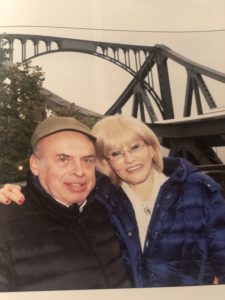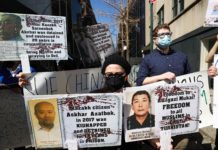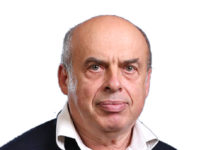
When Israeli politician and human rights activist Natan Sharansky published “Never Alone: Prison, Politics, and My People,” a memoir chronicling his years of political imprisonment in Soviet Russia and life after his release, it quickly drew global acclaim.
But his harrowing story also caught local attention when Sharansky named one of his liberators as Philadelphia resident Connie Smukler.
Released last year, Sharansky’s “Never Alone” reads: “[Connie Smukler] and her comrades created an international network of hospitality, hosting the families of prisoners of Zion, who crisscrossed the world … going from home to home, town to town, and country to country, advocating for their loved ones’ freedom.”
Sharansky praised Smukler as a pillar of strength during his incarceration.
“My experiences with Sharansky have defined me in many ways,” Smukler said. “I look at him and see a treasure for our Jewish people. It’s thrilling to know I’ve had a little bit to do with that. I want to be remembered as someone who made a difference. In a way, he’s given me that legacy.”
That legacy is an impressive one. Smukler and her husband, Joe, were leaders of a 1970s and 1980s movement to liberate thousands of Jews from an oppressive Soviet Union. This included refuseniks, Soviet Jews, such as Sharansky, who were stripped of their rights to emigrate.
 It wasn’t until 1973, during a visit to Israel, that Smukler realized how dire the situation was for refuseniks. On the trip, the Smuklers met a Soviet man who pleaded with them to save his brother’s life. “You have to get my brother out of Leningrad. He is my whole life. I cannot live without him,” the man begged.
It wasn’t until 1973, during a visit to Israel, that Smukler realized how dire the situation was for refuseniks. On the trip, the Smuklers met a Soviet man who pleaded with them to save his brother’s life. “You have to get my brother out of Leningrad. He is my whole life. I cannot live without him,” the man begged.
That was the moment Smukler realized that she needed to take action. “I had never seen a Soviet Jew before,” she said. “But I had this charge, and I had to do something.”
After that interaction, Smukler helped inspire a local group of housewives who wanted to advocate for the freedom of Soviet Jews. Through the Soviet Jewry Council of the Philadelphia Jewish Community Relations Council, they organized protests, marches and hunger strikes, and they relentlessly lobbied Congress to take action.
Smukler, herself, made countless trips to the former Soviet Union, secretly meeting with Soviet Jews to hear their stories and help refuseniks navigate the Soviet oppression they faced. After a KGB interrogation in 1981, Smukler was no longer permitted entry to Russia until the fall of the Iron Curtain.
However, it was in 1975 when the Smuklers first met Sharansky during one of their visits to the Soviet Union. The couple and the refusenik activist immediately connected through their shared passion to champion the rights of Jewish people. Not long after this initial meeting, Sharansky was arrested and sentenced to the Soviet gulag, convicted for trumped-up charges.
“It was terrible. I didn’t know how I would survive. We supported other prisoners too, but he was my friend, and that made it even harder,” Smukler said.
The Smuklers campaigned for Sharansky’s release, and after nine years of imprisonment, he finally gained that freedom. Throughout that time, Smukler and her army of housewives persisted as part of an international network of efforts to pressure the Soviet Union to allow Jews to emigrate. By the late 1980’s, their work paid off and Soviet Jews began to receive more rights, including the right to emigrate.
Following this great achievement, Smukler continued to be an active leader in the local community. A current trustee and former vice chair of the Jewish Federation of Greater Philadelphia and board member of the Anti-Defamation League, Smukler remains steadfast in her belief that grassroots efforts can truly make a difference. She recently established the Constance and Joseph Smukler Tribute to the Global Soviet Jewry Movement: Let My People Go exhibit at the Museum of the Jewish People at Beit Hatfutsot in Tel Aviv, Israel.
“I grew up in a very anti-Semitic environment, always thinking I was missing something. Little did I know I was missing my Jewishness,” she said. “My husband used to say that in every Jew there’s a pintele yid [small spark of Jewish faith]. Sharansky helped light that spark, and it’s been on fire ever since.”





